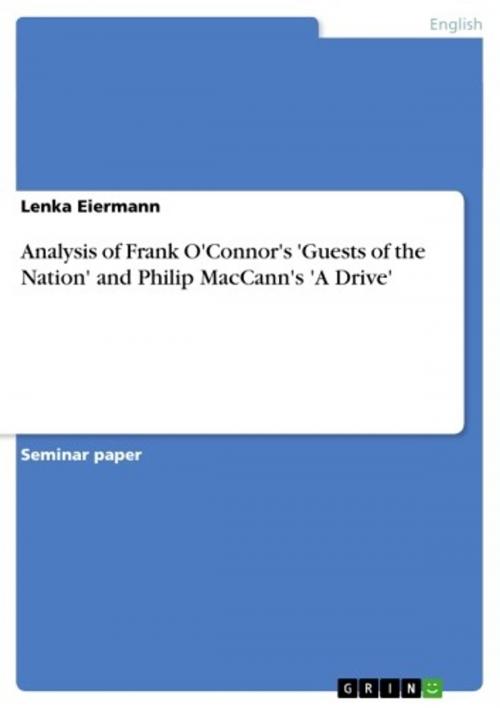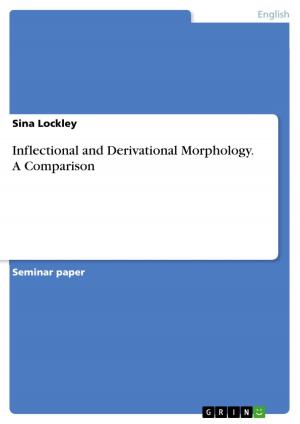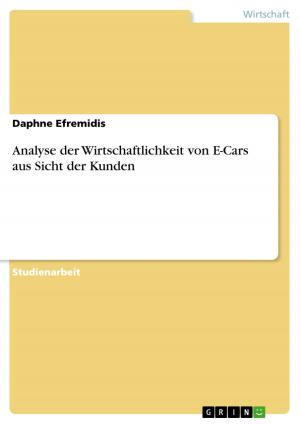Analysis of Frank O'Connor's 'Guests of the Nation' and Philip MacCann's 'A Drive'
Fiction & Literature, Literary Theory & Criticism, British| Author: | Lenka Eiermann | ISBN: | 9783638364294 |
| Publisher: | GRIN Verlag | Publication: | April 10, 2005 |
| Imprint: | GRIN Verlag | Language: | English |
| Author: | Lenka Eiermann |
| ISBN: | 9783638364294 |
| Publisher: | GRIN Verlag |
| Publication: | April 10, 2005 |
| Imprint: | GRIN Verlag |
| Language: | English |
Seminar paper from the year 2005 in the subject English Language and Literature Studies - Literature, grade: 2, University of Frankfurt (Main), 7 entries in the bibliography, language: English, abstract: In the following essay the short stories 'Guests of the Nation' by Frank O'Connor and 'A Drive' by Philip MacCann will be analysed and compared with regard to themes, the use of language, style, narrative voice and narrator characterization. Frank O'Connor, the author of 'Guests of the Nation' was born in Cork, Ireland, in 1903 as Michael O'Donovan. He was interned during the Civil War. O'Connor first published in 1920; his short-story 'Guests of the Nation' was published in 1931 in a collection of short-stories of the same name. Frank O'Connor is widely regarded as one of the masters of realistic short-stories in the twentieth century. He is also one of the most important translators of Irish poetry into English. Apart from short stories he wrote novels, literary history, biography, drama, travel books and extensive socially critical journalism. O'Connor's fiction often deals with war experiences, childhood or priesthood. Philip MacCann, who wrote the short-story 'A Drive', was born in Manchester, England, in 1966. He grew up in Dublin and studied Creative Writing at the University of East Angia. His first book 'The Miracle Shed', a collection of short-stories published in 1995, won the Rooney Prize for Irish Literature. In 1999 MacCann was named in the Observer newspaper's list of '21 Writers for the Twenty-First-Century'. He is also a regular writer for magazines and newspapers including 'The Guardian', 'Prospect' and 'The Spectator'.
Seminar paper from the year 2005 in the subject English Language and Literature Studies - Literature, grade: 2, University of Frankfurt (Main), 7 entries in the bibliography, language: English, abstract: In the following essay the short stories 'Guests of the Nation' by Frank O'Connor and 'A Drive' by Philip MacCann will be analysed and compared with regard to themes, the use of language, style, narrative voice and narrator characterization. Frank O'Connor, the author of 'Guests of the Nation' was born in Cork, Ireland, in 1903 as Michael O'Donovan. He was interned during the Civil War. O'Connor first published in 1920; his short-story 'Guests of the Nation' was published in 1931 in a collection of short-stories of the same name. Frank O'Connor is widely regarded as one of the masters of realistic short-stories in the twentieth century. He is also one of the most important translators of Irish poetry into English. Apart from short stories he wrote novels, literary history, biography, drama, travel books and extensive socially critical journalism. O'Connor's fiction often deals with war experiences, childhood or priesthood. Philip MacCann, who wrote the short-story 'A Drive', was born in Manchester, England, in 1966. He grew up in Dublin and studied Creative Writing at the University of East Angia. His first book 'The Miracle Shed', a collection of short-stories published in 1995, won the Rooney Prize for Irish Literature. In 1999 MacCann was named in the Observer newspaper's list of '21 Writers for the Twenty-First-Century'. He is also a regular writer for magazines and newspapers including 'The Guardian', 'Prospect' and 'The Spectator'.















